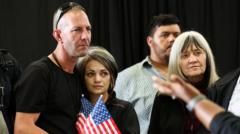The arrival of a group of 59 white South Africans at Dulles airport marks a significant and controversial moment as they receive expedited refugee status amid assertions of persecution in their home country. Claims from the Trump administration of "racial discrimination" faced backlash from various quarters, including the South African government, which disagrees on the narratives presented. As the situation unfolds, questions remain about the implications and motivations behind fast-tracking this group while other refugees face stringent admissions.
Dozens of White South Africans Granted Refugee Status in the US Amid Controversy

Dozens of White South Africans Granted Refugee Status in the US Amid Controversy
A group of 59 white South Africans arrives in the US under a contentious refugee program initiated by former President Trump.
In a notable reception at Dulles airport, the newly arrived group of white South Africans was welcomed by US authorities, many waving American flags amid a festive atmosphere. This influx results from a refugee plan expedited for the Afrikaner minority, which President Donald Trump has characterized as victims of "racial discrimination" in South Africa.
The announcement of the expedited refugee status for this group, however, has been met with significant condemnation. South African officials highlighted that the individuals did not face the persecution necessary for the refugee classification, asserting that the context of their claims has been falsely presented. Furthermore, the Trump administration's decision to halt other refugee admissions, including from war-torn nations, led to critiques from Human Rights Watch, which branded the priority given to the Afrikaners as an inadequate response to genuine cases of need from other global contexts.
When asked about the motivations behind the swift approval of the Afrikaners' status, Trump pointed to claims of "genocide", suggesting that white farmers in South Africa were specifically under attack—a view dismissed by many including South African President Cyril Ramaphosa. Ramaphosa emphasized that "a refugee must leave their country out of fear of political, religious, or economic persecution," and that the Afrikaners do not fall under these categories.
The disagreement over the facts is compounded by the contentious land reform policies in South Africa, which have historically benefited few black South Africans despite their overwhelming population. Claims of a “genocide” against white farmers have been largely refuted by factual evidence, and narratives commonly expounded by proponents of the refugee program have been criticized as disinformation.
Responses to the refugee processing have showcased deep political divisions within the US. Criticism from lawmakers, including Gregory Meeks, have labeled the administration's actions as a racially motivated distortion of facts that undermine the realities faced by other more deserving groups of refugees. In light of these controversies, various organizations, including the Episcopal Church, have pledged to halt their collaboration with the federal government on refugee resettlement due to what they perceive as preferential treatment.
In this climate of racial and political tension, the arrival of the white South Africans highlights the complexities of refugee admissions and the ongoing discourse surrounding race relations—both domestically and internationally. As the situation progresses, ongoing scrutiny from both US and South African stakeholders is expected as narratives continue to clash over the legitimacy of the refugee claims.
The announcement of the expedited refugee status for this group, however, has been met with significant condemnation. South African officials highlighted that the individuals did not face the persecution necessary for the refugee classification, asserting that the context of their claims has been falsely presented. Furthermore, the Trump administration's decision to halt other refugee admissions, including from war-torn nations, led to critiques from Human Rights Watch, which branded the priority given to the Afrikaners as an inadequate response to genuine cases of need from other global contexts.
When asked about the motivations behind the swift approval of the Afrikaners' status, Trump pointed to claims of "genocide", suggesting that white farmers in South Africa were specifically under attack—a view dismissed by many including South African President Cyril Ramaphosa. Ramaphosa emphasized that "a refugee must leave their country out of fear of political, religious, or economic persecution," and that the Afrikaners do not fall under these categories.
The disagreement over the facts is compounded by the contentious land reform policies in South Africa, which have historically benefited few black South Africans despite their overwhelming population. Claims of a “genocide” against white farmers have been largely refuted by factual evidence, and narratives commonly expounded by proponents of the refugee program have been criticized as disinformation.
Responses to the refugee processing have showcased deep political divisions within the US. Criticism from lawmakers, including Gregory Meeks, have labeled the administration's actions as a racially motivated distortion of facts that undermine the realities faced by other more deserving groups of refugees. In light of these controversies, various organizations, including the Episcopal Church, have pledged to halt their collaboration with the federal government on refugee resettlement due to what they perceive as preferential treatment.
In this climate of racial and political tension, the arrival of the white South Africans highlights the complexities of refugee admissions and the ongoing discourse surrounding race relations—both domestically and internationally. As the situation progresses, ongoing scrutiny from both US and South African stakeholders is expected as narratives continue to clash over the legitimacy of the refugee claims.






















